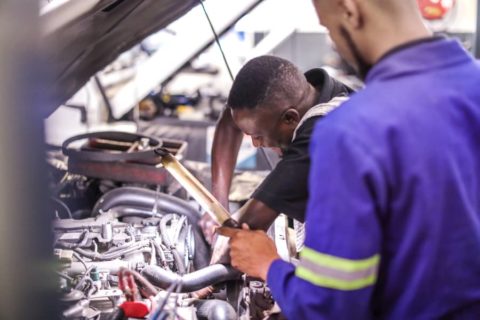Key Skills for Automotive Service Advisors
Service advisors are professionals who connect repair shops and dealerships with the customers they serve. As a public-facing role, advisors require a rather different skill set than automotive repair. If you pursue this track, you’ll be combining skills learned through your hands-on automotive training with robust customer service competency. NYADI The College of Transportation Technology provides an automotive technology program in Jamaica, New York, that helps prepare you for this role and more. Here, we cover the skills and abilities that are key to success as an automotive service advisor. What Are
How Effective Teamwork Skills Benefit Automotive Technicians
Technical skills can form the foundation for a rewarding career in the auto industry. However, these aren’t the only skills a technician needs; teamwork skills are also vital in an industry that rarely involves solo work. NYADI The College of Transportation Technology offers automotive academic programs in Jamaica, New York, that provide technical and soft skill development. Here, we discuss how effective teamwork skills can benefit your career as an automotive technician. Why Is Collaboration So Important? When you enter the automotive industry, you will quickly learn that technicians seldom work alone.
Exploring Career Opportunities as a Service Advisor at a Dealership
Not all careers in the automotive industry take place in a greasy garage. Some roles, such as service advisor, are focused on improving the customer experience at a dealership or repair shop. NYADI The College of Transportation Technology provides automotive training programs in Jamaica, New York, for students interested in automotive careers. Here, we explore what service advisors do and how our programs can help you become one. What Is a Service Advisor? When customers visit a car repair shop or dealership, they aren’t just paying for their service. They also want
Tips for Opening Your Own Auto Repair Business After You Graduate
If you aspire to own a business, enrolling in an automotive technology program is a great place to start. The vehicle repair industry offers ample opportunity to open a repair shop as an independent entrepreneur. NYADI The College of Transportation Technology teaches certification and associate degree programs in Jamaica, New York, to prepare future auto technicians for a variety of careers, including business ownership. Here, we discuss how to open a mechanic shop post-graduation and provide tips for success. Understand Your Expenses and Secure Financing Starting an auto shop isn’t cheap. It
How to Prepare for the Transition to Electric and Hybrid Vehicles as an Automotive Technician
Though once rare, electric and hybrid vehicles are becoming increasingly prominent on the road. These vehicles bring a range of benefits to their owners, from increased efficiency to a reduced carbon footprint. In the garage, however, they invite unique challenges. Vehicle technicians must adapt their approach in order to service electric cars properly. NYADI The College of Transportation Technology delivers high-quality degree and certificate programs in Jamaica, New York, to prepare students for successful futures in automotive service. Here, we discuss how you must prepare to become an effective electric car
Tips for Starting a Career as an Auto Parts Specialist
Do you want a career in automotive technology, but you don’t like the grease of garage work? Consider becoming an auto parts specialist. This role enables effective and efficient repairs by maintaining a reliable stock of parts. NYADI The College of Transportation Technology offers academic programs in Jamaica, NY, that train students for various jobs within the automotive industry. Here, we explore what an auto parts specialist does and provide useful tips for success in this career field. What Is an Auto Parts Specialist? Auto parts specialists play a vital role in
Advantages of Working With a Small Fleet After Getting Your Diesel Technology Degree
If you’re interested in pursuing or are working toward a diesel technology degree, there may be some questions about what to do after graduation. Have you considered becoming a small fleet mechanic? This job places you in a vital position to serve your company while building workplace relationships and solidifying a diverse skillset. NYADI The College of Transportation Technology offers an automotive and diesel technology degree program at our Jamaica, New York campus. Here, we discuss this rewarding path for graduates with diesel technology degrees. What Do Fleet Mechanics Do? Many businesses rely
Career Paths for Diesel Mechanics
Are you considering a career in the automotive or diesel industry? Completing an automotive training program and earning your certification can open up a wide variety of job opportunities with transferable skills that let you move seamlessly between placements. NYADI The College of Transportation Technology offers training programs, like automotive and diesel technology in Jamaica, New York. Here, we discuss some of the diesel mechanic jobs available to our graduates. Benefits of Diesel Mechanic Jobs Diesel mechanics or diesel service technicians are professionals who maintain, diagnose, and repair vehicles with diesel engines.
Top 5 Traits of a Great Fleet Manager
Managing a fleet of vehicles and their drivers is a complex task. Not only does it require automotive and technical ability, but it also demands organization, communication skills, and leadership. Though challenging, this career path can be highly rewarding with excellent pay and pride in your work. At NYADI The College of Transportation Technology in Jamaica, New York, we offer automotive academic programs, including automotive and diesel technology, to prepare you for careers in the auto industry. Here, we explore a common fleet manager job description and the qualities you
How Emission Guideline Changes Will Impact Automotive Technology
The past few years have seen significant shifts in vehicle manufacturing regulations. New guidelines from the United States Environmental Protection Agency (EPA) and state legislatures are demanding fewer carbon emissions from cars. As a result, automotive technology is changing to meet the requirements. NYADI The College of Transportation Technology provides automotive training programs in Jamaica, New York. Here, we explore what these changes are, how they impact automotive technology, and what future automotive technicians can do to keep up with the industry. Reducing Carbon Emissions from Cars In March of 2024, EPA










